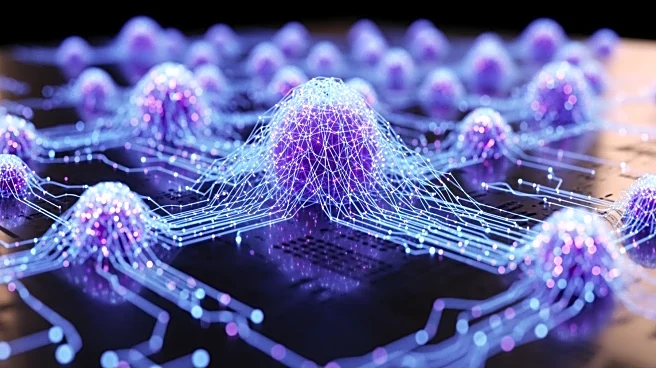What's Happening?
Researchers from the Quantum Computing Research Group have developed a new model family called Density Quantum Neural Networks (density QNNs) to improve quantum machine learning (QML) performance. This
framework, published in npj Quantum Information, utilizes mixtures of trainable unitaries subject to distributional constraints, balancing expressivity and trainability. The approach leverages the Hastings-Campbell Mixing lemma and commuting-generator circuits, facilitating shallower circuits with efficiently extractable gradients. This innovation addresses the training efficiency challenges faced by traditional parameterized quantum circuits (PQCs), which require evaluating numerous circuits for gradient computation. Density QNNs aim to overcome these limitations by offering improved gradient query complexity and drawing parallels to successful classical techniques like the Mixture of Experts (MoE). Numerical experiments validate these advancements, demonstrating improvements in performance and trainability across synthetic and image classification tasks.
Why It's Important?
The introduction of Density Quantum Neural Networks represents a significant advancement in quantum machine learning, addressing critical bottlenecks in training efficiency. By reducing the computational burden associated with gradient extraction, density QNNs enable the scaling of quantum models, potentially bridging the gap between quantum and classical deep learning capabilities. This development is crucial for leveraging near-term quantum hardware, which is currently limited by circuit depth and qubit coherence. The framework's connection to classical techniques like the Mixture of Experts offers potential benefits in model capacity and data utilization, enhancing the robustness and generalization of quantum models. As quantum computing continues to evolve, density QNNs provide a promising path toward more practical and scalable quantum machine learning applications.
What's Next?
The successful implementation of density QNNs opens avenues for further exploration in quantum machine learning. Researchers may focus on expanding the framework to accommodate larger and more complex datasets, potentially integrating additional classical techniques to enhance model performance. The development of more efficient gradient extraction methods could lead to the training of billion-parameter quantum models, akin to those in classical deep learning. As quantum hardware improves, density QNNs could play a pivotal role in advancing quantum computing applications across various industries, including finance, healthcare, and technology.
Beyond the Headlines
Density Quantum Neural Networks offer a quantum-native analogue to classical machine learning techniques, potentially enhancing model interpretability and robustness. The framework's ability to mitigate overfitting through the Mixture of Experts formalism provides a natural mechanism for improving generalization performance. As quantum computing technology advances, density QNNs could contribute to the development of more efficient and expressive quantum models, paving the way for innovative solutions to complex real-world problems.










